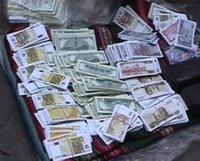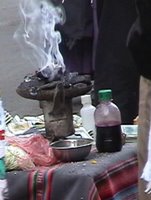Alasita 2006: From Dreams to Reality
 After inaugurating a new President and welcoming a new Cabinet, the citizens of La Paz celebrated the traditional fair of Alasita which begins every January 24th at Noon. The symbolism of new beginnings came full circle as residents purchased miniature replicas of cars, homes, official documents and money, hoping for prosperity in the coming year.
After inaugurating a new President and welcoming a new Cabinet, the citizens of La Paz celebrated the traditional fair of Alasita which begins every January 24th at Noon. The symbolism of new beginnings came full circle as residents purchased miniature replicas of cars, homes, official documents and money, hoping for prosperity in the coming year.At the Plaza Murillo President Morales was presented with an oil well and agrarian titles by Pablo Groux, Senior Officer of Culture, as reminders of the nationalization of hydrocarbons and the plight of Bolivian farmers. One of his gifts also included scissors to end corruption. After receiving his gifts, Morales kicked off the festivities around the Plaza Murillo, which involved a parade that surrounded the square, with live music and dancing.

Walking along the street market on Calle Yanacocha, heading towards Plaza San Francisco, the snow-capped Andes were visible in the distance for the first time since our arrival in La Paz on Friday morning. Vendors, who two days before were selling hats, gloves, batteries and sweets had changed their wares for the Alasita fair - most were now offering stacks of “billetitos”. Some of the funny money looked real enough to pass along to an unsuspecting person in the United States or European Union.
 One can acquire an entire replica of their own business, whether an Internet café, a doctor's office, or a lawyer’s office for about 10 Bolivianos or the equivalent of $1.50 (USD). For those who yearn to travel, Alasita offers miniature suitcases and passports from around the world.
One can acquire an entire replica of their own business, whether an Internet café, a doctor's office, or a lawyer’s office for about 10 Bolivianos or the equivalent of $1.50 (USD). For those who yearn to travel, Alasita offers miniature suitcases and passports from around the world.If one desires change and prosperity in their personal relationships replicas of marriage certificates or certificates of divorce are available for purchase. Young people bent over tables writing their names onto college diplomas and military certificates with the belief that this exercise would bring their dream that much closer.
After purchasing a miniature, Bolivians will take their desires to one of the “yatiris” or wise men standing along the street. The smell of burning incense filled the air as yatiris placed flower petals over hot coals, and for a small price, will place objects through the smoke in an offering to the Aymaran god Ekeko.
The Traditional Fair of Alasita was carried out in different cities across Bolivia. Alasita is a word in the Aymara language which means "Comprame" or “buy me”. It is a celebration of devotion to Ekeko, the God of abundance. By offering objects to him, Ekeko fulfills the desires of his devotees. People buy objects in miniature with the firm belief and faith that their desires will become reality.


<< Home